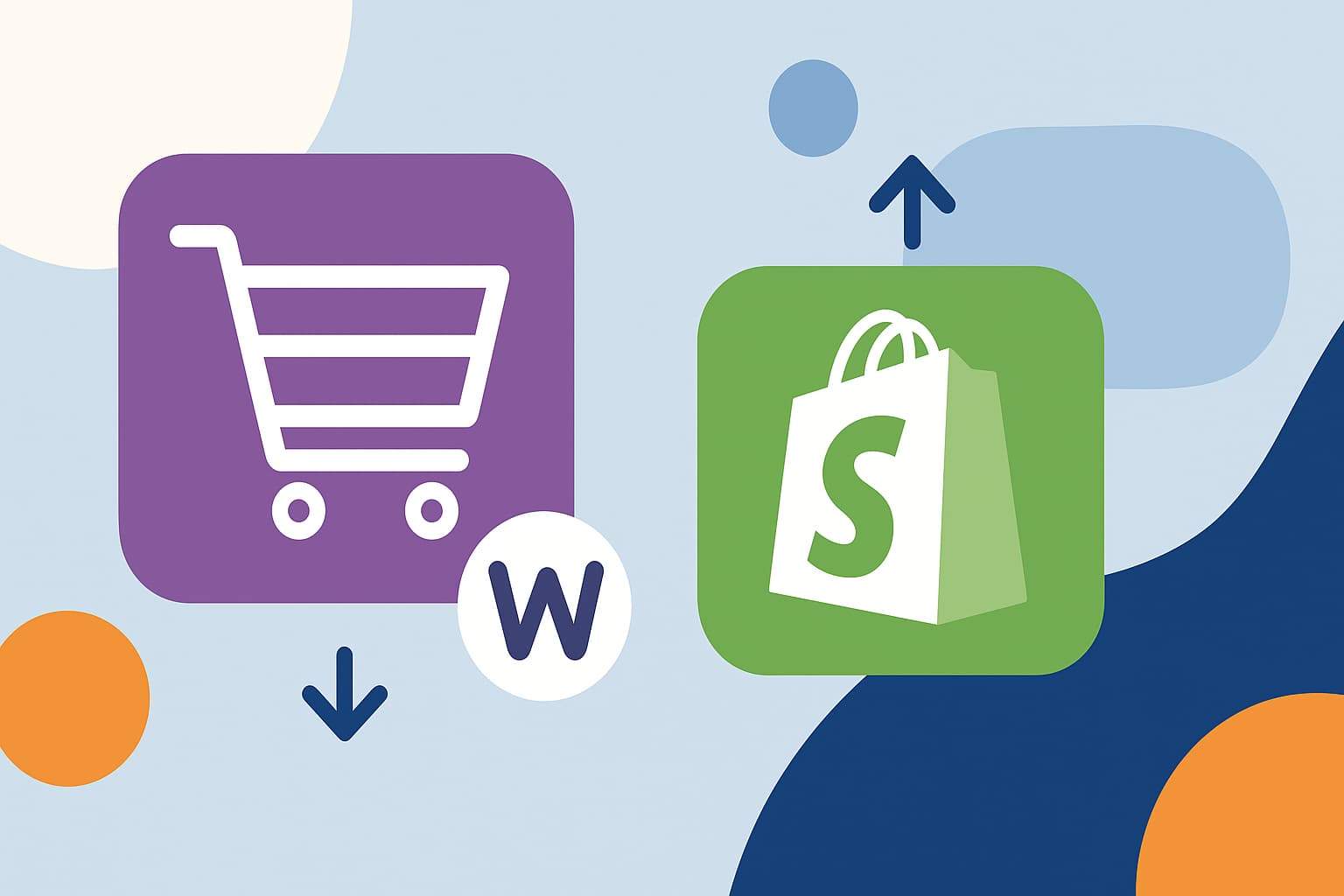Best E-commerce Solutions for WordPress: WooCommerce vs. Shopify

Are you looking for the difference between WooCommerce vs. Shopify and finding the best E-commerce solutions for WordPress?
Choosing the right e-commerce solution can define your online business. If you’re building on WordPress, the top contenders are WooCommerce and Shopify.
In short: if you want full control and lower long-term costs, go with WooCommerce. If you need a quick setup, built-in hosting, and minimal maintenance, Shopify is your best bet.
Explore data, features, expert opinions, and FAQs to help you make an informed choice.
Table of Contents
Why This Choice Matters
More than 40% of all online stores use either WooCommerce or Shopify.
- Shopify powers 26.2% of e-commerce websites worldwide.
- WooCommerce supports around 20.1% of the market.
(Source: MobiLoud, 2025)
Your platform affects cost, scalability, SEO, and customer experience — so it’s a critical decision for your brand’s long-term success.
What Is WooCommerce?
WooCommerce is a free, open-source plugin that turns any WordPress site into an online store. You manage hosting, security, and customization, giving you total control.
Pros:
- 100% customization freedom
- No platform transaction fees
- Works seamlessly with WordPress SEO tools
Cons:
- Technical setup required
- Maintenance and hosting costs depend on you
“WooCommerce is perfect for anyone who wants complete control over their store’s look, data, and experience.” — CommerceGurus
What Is Shopify?
Shopify is a fully-hosted ecommerce platform. It handles hosting, security, and maintenance while offering an easy-to-use dashboard and app ecosystem.
Pros:
- Fast setup (live in hours)
- Secure and reliable hosting
- 24/7 customer support
Cons:
- Monthly subscription and app fees
- Less backend customization
“Shopify is ideal for businesses that want to start selling quickly with minimal technical setup.” — WebsiteBuilderExpert, 2025
WooCommerce vs Shopify: Side-by-Side Comparison
| Feature | WooCommerce | Shopify |
|---|---|---|
| Ease of Use | Requires setup and hosting | Plug-and-play |
| Customization | Full code access | Limited to templates |
| Hosting | Self-hosted | Hosted by Shopify |
| SEO & Content | Excellent (WordPress) | Good (limited flexibility) |
| Transaction Fees | None (beyond gateway) | 0–2% (if not Shopify Payments) |
| Support | Community-based | 24/7 official support |
| Cost | Varies (depends on plugins) | Fixed monthly plans |
| Scalability | Hosting dependent | Built-in infrastructure |
Real-World Data and Trends
- Shopify hosts 4.6 million active stores globally.
- WooCommerce powers 3.5 million stores worldwide.
- Shopify dominates large enterprises, while WooCommerce dominates small to mid-sized WordPress sites.
(Source: MobiLoud, 2025)
“Shopify’s scale and reporting make it the better option for medium and large businesses.” — ExpertMarket
Cost Comparison
- Shopify: Starts at $29/month, includes hosting, SSL, and basic tools.
- WooCommerce: Plugin is free, but hosting, themes, and security can range $10–$200/month, depending on setup.
👉 Shopify = predictable cost. WooCommerce = flexible cost (you control what you pay for).
Performance and Scalability
- Shopify handles server uptime, caching, and traffic spikes automatically.
- WooCommerce scales well with quality hosting and caching plugins like WP Rocket or Cloudflare.
“Shopify’s infrastructure ensures high performance under heavy load, while WooCommerce’s scalability depends on your host.” — PixelCrayons Blog, 2025
SEO and Marketing Power
WooCommerce leverages WordPress SEO strength, giving you control over URLs, metadata, and blogging.
Shopify includes SEO basics but has limited control over advanced settings like schema and redirects.
If content marketing and organic growth are core to your strategy — WooCommerce wins.
Security and Maintenance
- Shopify: PCI-compliant, SSL included, automatic updates.
- WooCommerce: Requires manual updates, third-party security plugins (e.g., Wordfence).
Shopify provides hands-off security. WooCommerce offers flexibility but needs vigilance.
Support and Ecosystem
- Shopify: 24/7 live support via chat, email, and phone.
- WooCommerce: Community-driven support, documentation, and hosting support (depending on provider).
If you prefer a single point of contact for help, Shopify feels safer. Developers and tech-savvy users may prefer WooCommerce’s open community.
Which One Should You Choose?
Choose WooCommerce If You:
- Already use WordPress.
- Want deep control over customization and data.
- Have technical skills or a developer.
- Rely heavily on content marketing.
Choose Shopify If You:
- Need to launch quickly.
- Don’t want to handle hosting or updates.
- Value convenience over customization.
- Prefer predictable monthly costs.
Expert Opinions Summary
- CommerceGurus: “WooCommerce is ideal for businesses that value total control.”
- WebsiteBuilderExpert: “Shopify simplifies ecommerce for fast-moving businesses.”
- ExpertMarket: “Shopify’s advanced reporting and scalability give it an edge for larger stores.”
Pros and Cons Summary
WooCommerce
✅ Full customization
✅ Control over data & SEO
❌ Requires technical know-how
❌ Maintenance is your responsibility
Shopify
✅ Easy setup
✅ Secure & reliable
❌ Monthly fees & less flexibility
❌ Transaction fees if using 3rd-party gateways
Conclusion: WooCommerce vs Shopify — What’s Best for You?
Both platforms are industry leaders — but your goals, skills, and budget will decide the winner.
- Choose WooCommerce for flexibility, control, and SEO power.
- Choose Shopify for simplicity, reliability, and faster time to market.
If you’re just starting out, test both: build a demo store on Shopify and a sandbox site with WooCommerce. Compare setup ease, cost, and management comfort. The right platform will quickly feel natural.
Frequently Asked Questions (FAQ)
Which is more popular — WooCommerce or Shopify?
Shopify currently leads in market share (26.2%) while WooCommerce holds 20.1%. Both are leaders in ecommerce for WordPress.
Is WooCommerce cheaper than Shopify?
Initially yes, since WooCommerce is free. However, premium plugins and hosting can increase costs. Shopify has predictable monthly fees.


